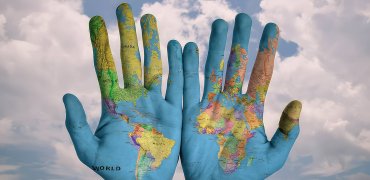New member
- Joined
- Aug 30, 2024
- Messages
- 9
- Thread Author
- #1
The cultural history of humanity is a long and complex journey, spanning multiple stages of development from prehistoric times to the modern era. Each stage has its unique characteristics, reflecting the evolution of human thought, art, religion, knowledge, and society. Below is an overview of the major stages in the cultural history of humanity.
1. Prehistoric Period
- Characteristics: This is the earliest stage in human history, starting from the appearance of humans until the advent of writing. The culture of this period is reflected through archaeological remains such as caves, stone tools, and cave paintings.
- Tools and Art: Humans during this time used tools made of stone and bone and developed primitive art through cave paintings. Spiritual culture and religion also began to take shape, with burial rituals and worship practices.
Photo: wikipedia.org/wiki/Cultural_globalization
2. Ancient Period
- Formation of Major Civilizations: The culture of the ancient period flourished with the formation of major civilizations such as Mesopotamia, Egypt, Greece, and Rome. This was the era of the invention of writing and the significant development of human knowledge and technology.
- Art and Architecture: The art and architecture of this period were heavily influenced by religion and politics, with grand structures like the Pyramids, the Hanging Gardens of Babylon, and Greek temples. Literature, philosophy, and science also began to thrive.
Photo: wikipedia.org/wiki/Cultural_globalization
3. Medieval Period
- Influence of Religion: The Medieval period witnessed the spread of Christianity and Islam, deeply influencing the culture and society of Europe and the Middle East. The art and architecture of this period were primarily religious, with the construction of churches, monasteries, and cathedrals.
- Cultural and Intellectual Movements: The late Medieval period saw the rise of the Renaissance, a cultural movement that revived classical values and significantly advanced art, science, and knowledge.
Photo: wikipedia.org/wiki/Cultural_globalization
4. Renaissance and Enlightenment
- Renaissance: The Renaissance (14th-17th centuries) was a period of rebirth of classical Greek and Roman culture. Art, literature, and science flourished, with notable figures like Leonardo da Vinci, Michelangelo, and Galileo.
- Enlightenment: The Enlightenment (17th-18th centuries) marked the development of rational thought and philosophy, with contributions from thinkers such as Voltaire, Rousseau, and Kant. This period also saw scientific discoveries and the rise of democratic institutions.
Photo: wikipedia.org/wiki/Cultural_globalization
5. Modern Period
- Industrial Revolution: The 19th century marked the beginning of the Industrial Revolution, leading to significant changes in the economy, society, and culture. The development of technology and industry created large cities and new social classes.
- Contemporary Art and Culture: The 20th and 21st centuries have witnessed the diversification of art and culture, with the emergence of modern and postmodern art movements such as Realism, Surrealism, and Contemporary Art. Meanwhile, globalization has deeply influenced traditional cultural values.
Photo: wikipedia.org/wiki/Cultural_globalization
6. Globalization and Modern Culture
- Globalization: The development of information technology and communication has made the world more interconnected than ever before. This has affected not only the economy but also culture, as values and lifestyles are transmitted and adopted globally.
- Cultural Diversity: Modern culture is a blend and exchange of different cultures, creating a rich and diverse global cultural landscape. Issues such as the preservation of traditional culture, popular culture, and cultural identity are becoming important topics in contemporary society.
Photo: wikipedia.org/wiki/Cultural_globalization
The cultural history of humanity is a continuously evolving and developing journey. Each stage and each civilization contributes to the overall picture of human culture, reflecting creativity, adaptability, and evolution over thousands of years.
Attachments
Relate Threads
